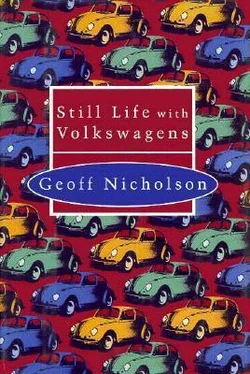Davey doesn’t move from the lay-by, lets Lederer sleep for several hours, into the late afternoon, but then he decides it’s time he was moving on and finding a caravan site for the night. His guidebook says there’s a well-equipped place about fifteen miles along the coast. He gently shakes the old man awake. Again he sees that lost, startled expression.
“Look,” says Davey, “I’m going to make a suggestion.”
Lederer looks extremely apprehensive.
Davey continues, “Why don’t you come along to the campsite with me. They’ve got showers and sinks. You could get cleaned up, have a shave, and you could get rid of those stinking old clothes and I’ll give you some of my old jeans and shirts and trainers. And I’ll give you a proper hot meal, and after that, well, after that you can go on your way.”
Lederer looks distrustful. He says, “And what do I give you?”
“Nothing. You don’t have anything, do you?”
“So why are you offering to do this? What will you be getting out of it?”
“A good feeling,” says Davey.
Charles Lederer weighs that up for a long time before he says, “Well, thank you very much. That would be most acceptable.”
At first they don’t talk much as they drive. Davey has thrown the windows wide open to disperse his passenger’s smell. Now that he’s awake, Lederer is vibrantly restless. He refuses to wear a seatbelt and bounces up and down erratically in his seat like an eager child.
“I used to tell them,” he says at last, “in the House, I used to tell them that public transport wasn’t the answer.”
“Yes?” says Davey, not listening.
“I used to say that public transport would be all very well if it wasn’t full of the public.” He laughs rather uncontrollably at his own joke. “People want to shut themselves up in little tin boxes, and I say good for them. Best place for them. This is a very pleasant vehicle.”
“Yes, I like it,” says Davey.
Suddenly Charles Lederer throws himself back in his seat. Davey fears he might have been stung by a wasp, or even had a heart attack.
“Stop this vehicle at once!” Lederer shouts.
Instinctively Davey slams on the brakes and the van slews to a halt.
“I’ve just seen. I’ve just realised,” says Lederer. “You’ve been very kind, very generous, but now I realise this vehicle, it’s a Volkswagen isn’t it!!”
“Well yes,” says Davey.
With that Charles Lederer lets out a scream, flings open the passenger door and sprints away from the van, over a barbed wire fence and into a field of cows. He moves at top speed, his limbs flapping as he goes. Davey is surprised he can move so fast and watches as he recedes without ever looking back.
Davey waits for a long time and at last realises there’s nothing to be done. The old man has gone for good. He closes the passenger door and drives on to his intended campsite. That evening he falls into conversation with a group of German tourists who assure him that Germany is one of the world’s great liberal democracies. That night it pours with rain again.
Barry Osgathorpe is sitting at the wheel of Enlightenment when a voice outside the car shouts, “What a wicked-looking Beetle!” Barry thinks, ‘Not again’ but turns his head to find that the person offering the opinion on his car is not the usual sort who offers such opinions. This is a middle-aged man in an immaculate black suit, with silver hair and a scar at the corner of his mouth. The man is somehow so impressive, so authoritative-looking and sounding that Barry can only say, “Well, thanks very much.”
“Do you mind if I pop in beside you?”
And before Barry can say yes or no the man is sitting next to him in the car, and making himself very comfortable.
“I think it’s the blackness of this vehicle that’s so impressive,” the man says. “It’s the smoothness, the sense of a whole. It has a power, an elemental, archetypal quality, a sense of sculptural integrity.”
Barry stares at the man, checks his facial expression for irony or mockery, but he can find no trace of either.
“Well, yes,” says Barry, “that’s pretty much the way I see it too.”
“Of course you do,” the man says, then adds, “God, I really love Volkswagen Beetles.”
He says it not as though he is expressing some happy enthusiasm, but rather as though he is confessing to a deep, dark obsession.
“The name’s Phelan,” he says, and he extends a hand to be shaken. Barry takes it and says, “Call me Barry.”
“I’m just like you, Barry,” he says. “I love my own Beetle so much that I could just sit in it all day long, experiencing that sense of pleasure, that feeling of strength through joy, Kraft durch Freude.”
Barry nods. He is almost tempted to ask the man what kind of Beetle he owns, but he resists.
“Only a genius could have created a machine like the Beetle,” the man continues. “But of course you know all this.”
“Yes,” says Barry.
“Good. Since you know the history I won’t be doomed to repeat it.”
The man laughs lifelessly and Barry says, “I’m not intending to repeat anybody’s history, least of all my own.”
“Very good,” says the stranger. “You want new experiences. You’re ready for the next step. You’re ready to move on. Maybe I can be of service.”
Barry fears he may be about to try selling him his services as a removal expert, or as an insurance broker, or possibly as some kind of pimp. None of these will be at all welcome so he says, “I don’t think that seems very likely.”
“Of course it doesn’t seem likely . Nor did it ever seem likely that a car conceived in pre-war Nazi Germany would go on to conquer the world. But it did, didn’t it?”
Barry is not sure that the Beetle actually conquered the world, and even if it did, he’s not sure that world conquest is per se such a very good thing. He prefers to believe that the Beetle was a well-made, slightly unusual, not too expensive, reasonably soulful car that gave pleasure and service to a very great number of people, even if it also caused pollution, congestion and death to a certain number of others. Nevertheless, he doesn’t argue with the man, not that the stranger is really waiting for any response from Barry.
“I’m a pretty good judge of character,” the man says. “I can see you’re not some boring, run of the mill Beetle enthusiast. I can see that you have some spirit, some unconventional attitudes.”
Not even Barry can deny that.
“You’re one of us,” the stranger says.
“I don’t know who you are,” Barry says.
“Don’t you? I think perhaps you do.”
Barry insists that his ignorance is authentic, and the stranger takes this as another cue to hold forth.
“Look Barry,” he says, “you and I know it’s hell out there. There are too many people competing for too few resources.”
Barry has to agree.
“But it’s more complicated than that. It isn’t just a question of reducing numbers, or of slicing the pie more evenly as some fools might suggest. The problem is that the wrong people are in control.”
“You can say that again,” Barry agrees.
“You’re like me Barry. You look at all these people and what do you see? Do you see your equals? Do you see creatures made in God’s image? I don’t think so Barry. I think you see a lot of useless clutter. Don’t you think a lot of that clutter could be tidied away?”
“I’ve never thought about it,” Barry says.
“Oh, I think you have,” Phelan says insinuatingly. “Haven’t you ever thought to yourself that the world would be a much better place if only there were more people like you in it?”
“I suppose so.”
“I’m here to tell you Barry, that there are more people like you in the world than you might think. Take a drive round the M25 Barry. What traits are displayed by your fellow man? Aggression, selfishness, bad temper, competitiveness, madness brought on by stress. That’s not what the world ought be like, is it?”
Читать дальше












